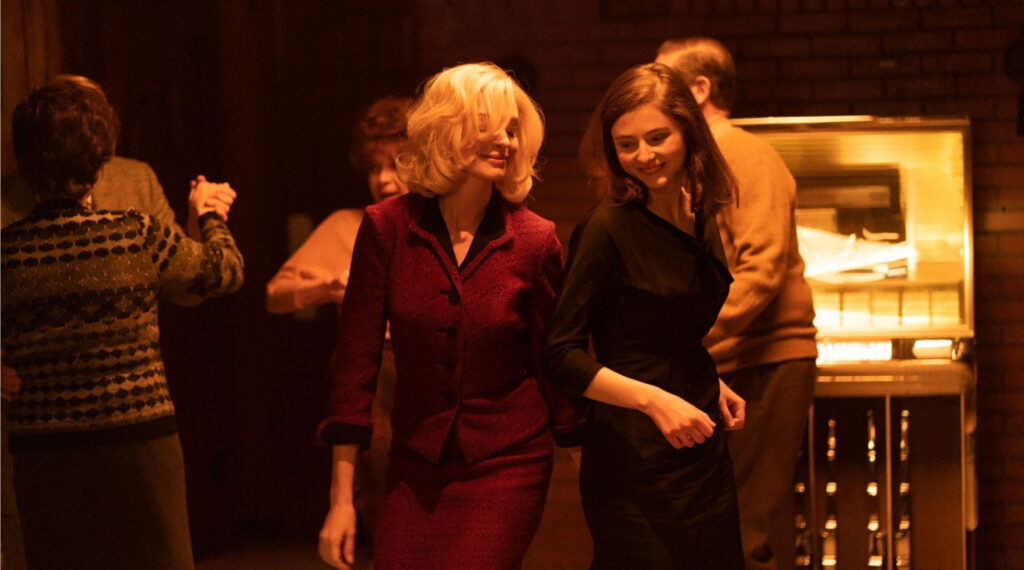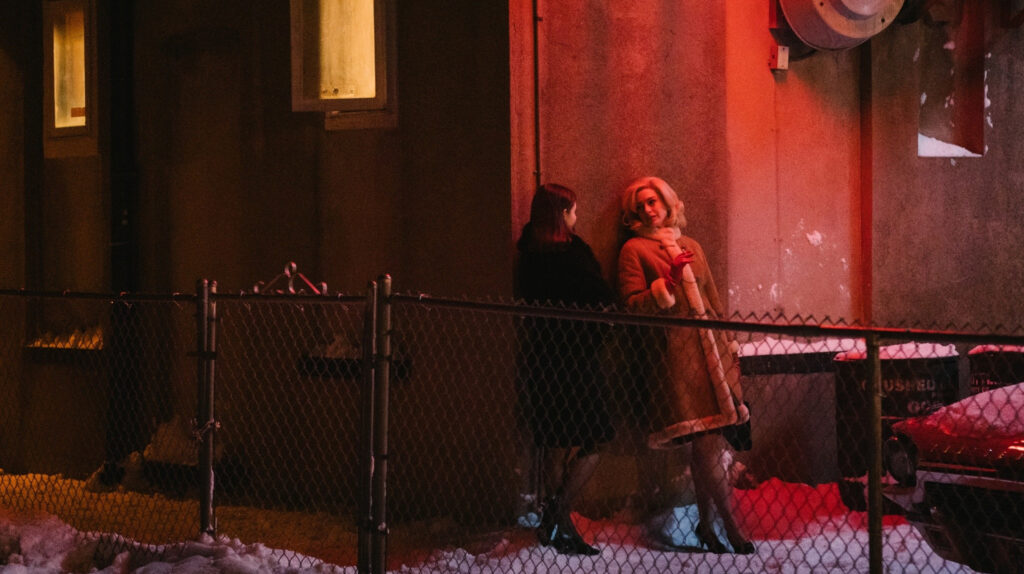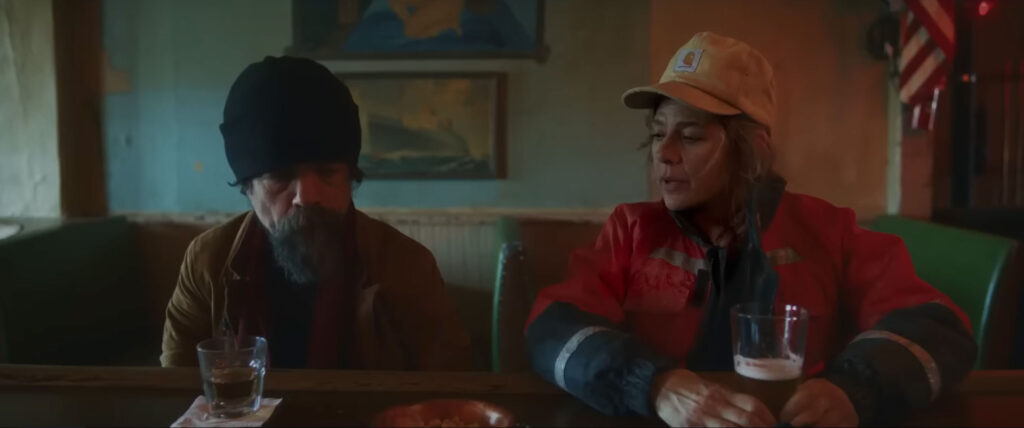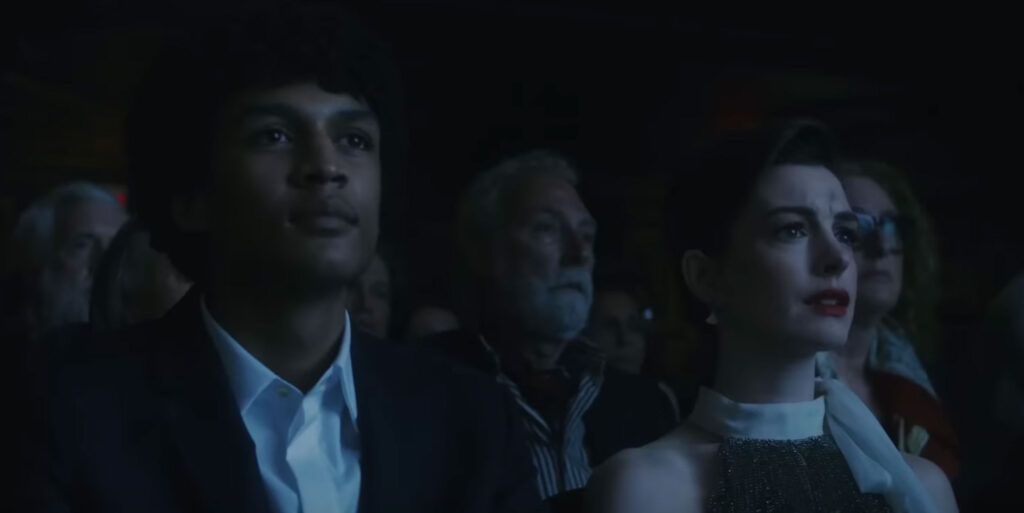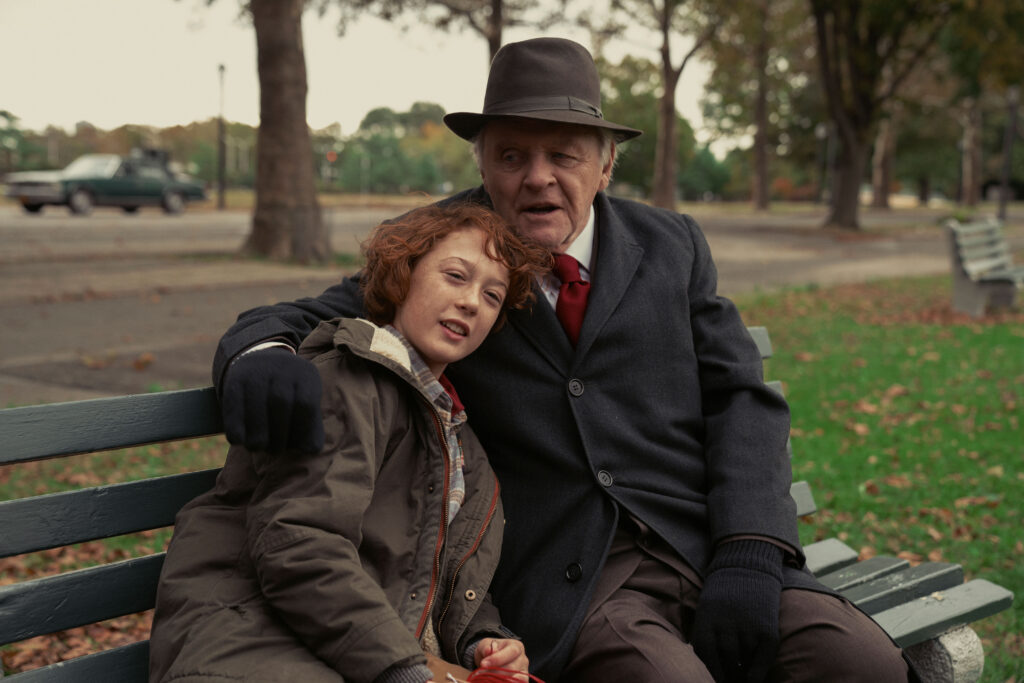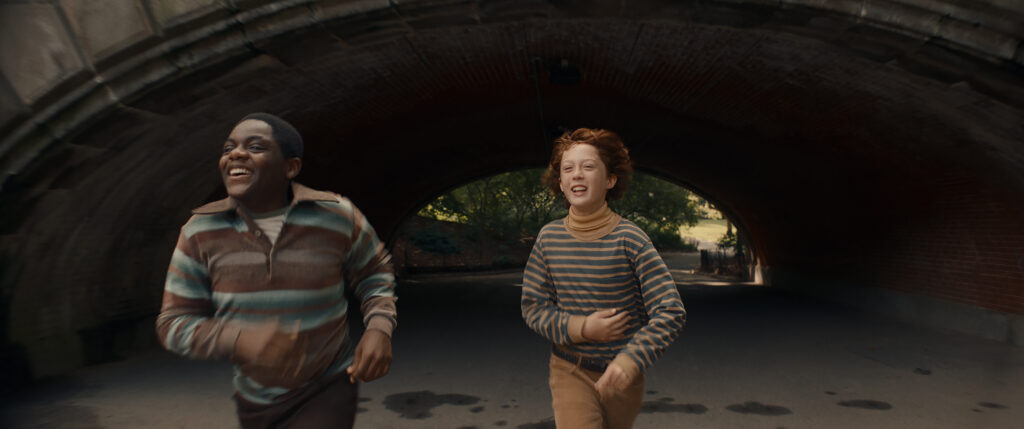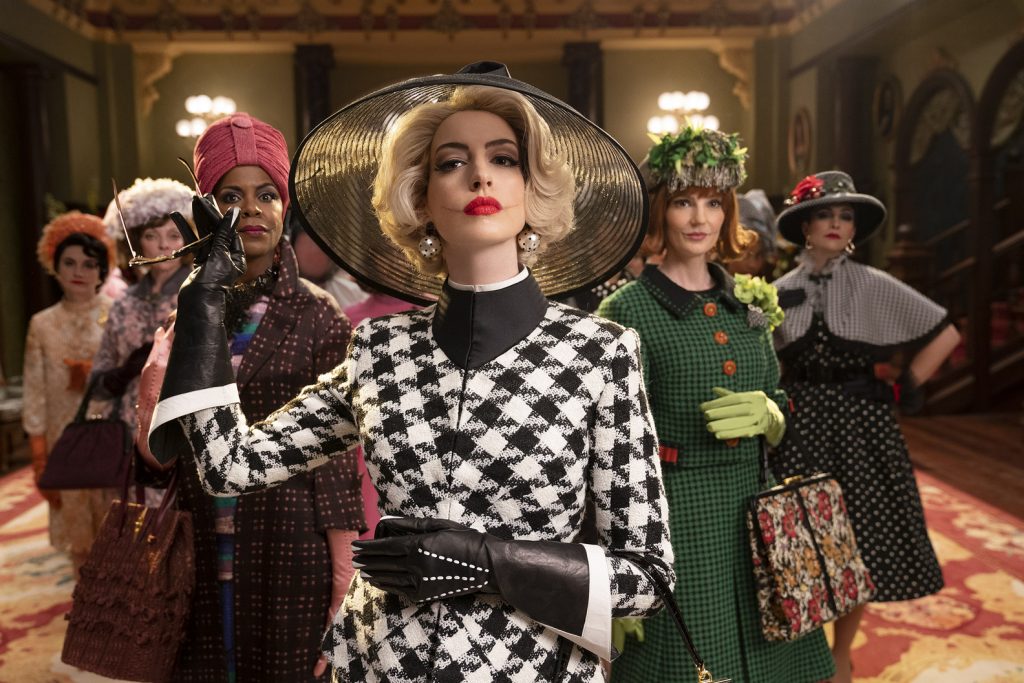April 14, 2024
by Carla Hay
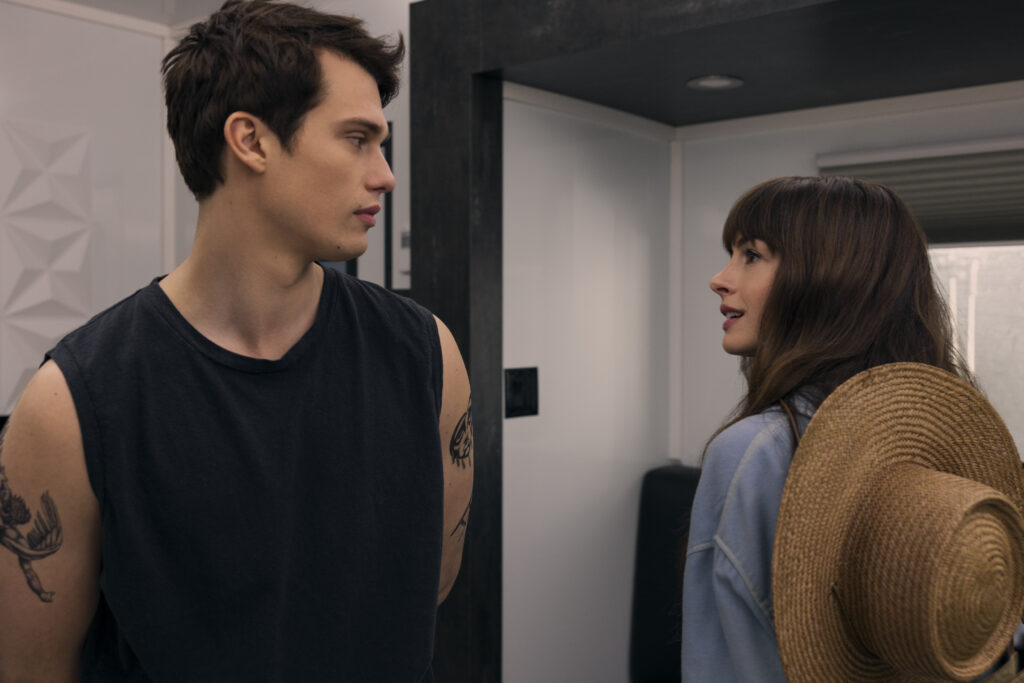
Directed by Michael Showalter
Culture Representation: Taking place in California and various parts of Europe, the comedy/drama film “The Idea of You” (based on the novel of the same name) features a predominantly white cast of characters (with some black people and Asians) representing the working-class, middle-class and wealthy.
Culture Clash: A divorced American mother, who is an art-gallery owner and who turns 40 years old in the story, has a controversial romance with a British pop star, who is 16 years younger than she is.
Culture Audience: “The Idea of You” will appeal primarily to people who are fans of the movie’s headliners and well-acted movies about romances where there’s a big age gap between the love partners.
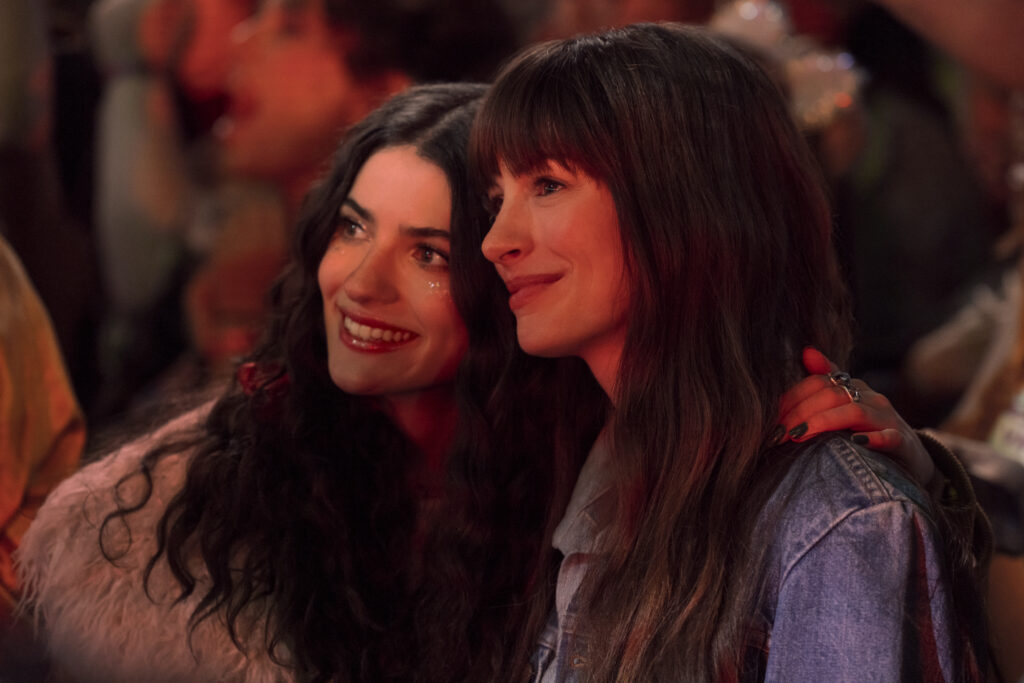
“The Idea of You” is utterly formulaic, but the movie benefits from Anne Hathaway’s radiant and realistic performance as a divorced mother in love with a pop star who is 16 years younger than she is. Nicholas Galitzine also shines as a charismatic charmer. One of the refreshing things about the movie is that it doesn’t try to pretend that the two lovers at the center of the story are meant to be married soul mates who will live happily ever after. This movie is a celebration of living in the moment and embracing happiness where you can find it.
Directed by Michael Showalter, “The Idea of You” is written by Showalter and Jennifer Westfeldt. The screenplay is adapted from Robinne Lee’s 2017 novel of the same name. Fans of the book might want to know that although the movie’s overall plot is the same as the book, the ending of the movie is different from the book’s ending. The tone of the movie is also more comedic than the much more serious tone of book. “The Idea of You” had its world premiere at the 2024 SXSW Film and TV Festival.
In “The Idea of You,” Solène Marchand (played by Hathaway), who turns 40 years old during this story, is the owner of a successful and progressive art gallery called Marchand Collective, in Los Angeles’ Silver Lake district. Solène is a divorced mother of a vivacious 17-year-old daughter named Izzy (played by Ella Rubin), who is in her last year of high school called Campbell High School. Solène has primary custody of Izzy, while Solène’s ex-husband Daniel (played Reid Scott) has visitation rights. Daniel is a lawyer who is married to his second wife Eva (played by Perry Mattfeld), a lawyer who’s about 15 years younger than Daniel.
The movie begins in the spring season. Izzy and her two close teenage schoolmates—flamboyant Zeke (played by Jordan Aaron Hall) and mild-mannered Georgia (played by Mathilda Gianopoulos)—are planning to go to the annual Coachella Valley Music and Arts Festival in Indio, California, which is about 129 miles southeast of Los Angeles. Daniel has promised to drive Izzy and her pals to the festival and be their chaperone. During this weekend excursion while Izzy is away, Solène plans to take a camping trip by herself. Solène has friends, but her life mostly revolves around her job and Izzy.
On the day that Daniel is supposed to take Izzy, Zeke and Georgia to Coachella, Daniel finds out that he has to go to Houston on a sudden business trip. Daniel persuades a reluctant Solène to be the Coachella chaperone. Daniel already bought the festival VIP tickets, as well as a VIP meet-and-greet experience for August Moon, a superstar pop singing group performing at Coachella.
August Moon used to be Izzy’s favorite group when she was in seventh grade. Izzy feels that she now outgrown August Moon, which has a “teen idol” boy band image. Izzy is now into more “serious” music, not teenybopper pop. The fact that Daniel doesn’t know Izzy’s current taste in music (and didn’t care to find out) is an indication of how he’s out-of-touch with who Izzy currently is. By contrast, Solène knows Izzy very well because they are very close. Solène and Izzy are sometimes mistaken as sisters. Izzy is at a stage in her life when she wants to assert her independence from her parents.
At Coachella, Izzy and her pals go somewhere to see a performance, while Solène is by herself in a VIP lounge area. She asks someone where the nearest restroom is, and she’s pointed in the direction of some unmarked trailers. And here comes the “meet cute” moment. Solène accidentally goes in the trailer of Hayes Campbell (played by Galitzine), the British lead singer of August Moon.
Solène doesn’t see Hayes (who is somewhere else in the large trailer) when she uses the restroom. But she sees him when she comes out of the restroom. They both look startled to see each other there. Solène makes a snarky comment to Hayes that if he’s one of these ASMR people who likes to listen to people urinate, it’s a privacy violation. Hayes informs Solène that this is his private trailer.
And when he introduces himself as Hayes Campbell from August Moon, it’s Solène’s turn to be embarrassed. She tells him that she’s at the festival with her daughter Izzy, who used to be a fan of August Moon. Hayes seems a little embarrassed to hear this information but doesn’t take it as an insult. Solène explains that Solène’s ex-husband bought August Moon meet-and-greet passes for Solène, Izzy and Izzy’s two friends, so she will probably see Hayes later. By now, it’s obvious that Hayes is attracted to Solène, and she’s feeling the same way but trying to hide it.
The conversation between Solène and Hayes is cut short because he has to go on stage soon for August Moon’s performance. August Moon is portrayed in the movie as being very much like One Direction, but with much more generic songs than One Direction. Just like One Direction, the five members of August Moon didn’t know each other before auditioning to be in the group.
But unlike One Direction, the members of August Moon don’t all come from European countries. Hayes lives in London. Hayes’ closest friend in August Moon is Oliver (played by Raymond Cham Jr.), an outgoing American. Hayes describes the other August Moon members to Solène this way: Rory (played by Dakota Adan), who is also American, is the sensitive heartthrob; Aidan (played by Jaiden Anthony) is the group’s “Aussie rebel”; and Simon (played by Viktor White), originally from Ukraine, is a “brooding poet.”
Hayes might describe Rory as the group’s heartthrob, but the reality is that Hayes is the member of August Moon who gets the most “heartthrob” attention. (Hayes is August Moon’s version of Harry Styles from One Direction.) In other words, anyone who dates Hayes will get a massive amount of scrutiny from fans and the media. You know where all of this is going, of course. Luckily for Solène, Rory was always Izzy’s favorite member of August Moon.
Solène, Izzy, Zeke and Georgia are in the audience during August Moon’s Coachella performance. Izzy and her pals are mainly there for nostalgia reasons, not because they are huge fans of the group. Hayes changes the rehearsed set by singing “Closer to You” and adding a dedication before the song by saying, “I met someone today.” Solène is close enough to the stage for Hayes to make eye contact with her and to let her know that he’s dedicating the song to her. (Galitzine does his own singing in the movie and on the soundtrack album.)
Solène is aware that most of the fans in the audience would love to have this type of attention, but she feels a mixture of embarrassment and flattery. Later at the meet-and-greet event with August Moon, Hayes flirts with Solène some more. Solène doesn’t think of it as more than harmless flirting that will go nowhere.
Shortly after her 40th birthday party (where Solène met some incompatible bachelors), she gets a surprise when Hayes shows up at her art gallery and buys everything in it. Hayes flatters Solène and continues to flirt with her. His vocabulary is pretty limited—he tells Solène, “I think you’re smart and hot”—but she finds his attention pretty irresistible. She agrees to spend time with him but says she’s not looking to “date” him.
Hayes has some time in Los Angeles before August Moon begins a European tour. Hayes and Solène go on some platonic dates, but their attraction to each other grows after they open up to each other about their personal lives. Solène tells Hayes that she and Daniel were college sweethearts who became parents shortly after they graduated from college and got married after parenthood. Solène is candid about how she has a hard time believing in love because she thought she had a solid marriage before Daniel left her for Eva, who was a junior attorney at his law firm at the time. Solène (who is no longer in love with Daniel) was the last person in their social circle to find out about Daniel’s infidelity.
As for Hayes (who is an only child), he talks about being raised by a single mother and having a father who was mostly absent from Hayes’ life. Hayes’ father didn’t reconnect with Hayes until after Hayes became rich and famous. Hayes has mixed feelings about it but is open to having his father back in his life, even if it’s a troubled relationship. One of the flaws in “The Idea of You” is that there is absolutely nothing that shows how Hayes is with his family, nor does Solène seem interested in meeting any of his family members.
Hayes essentially begs Solène to go on tour with him in Europe. The tour conveniently happens during the same time that Izzy will be away at summer camp. Solène is hesitant and comes up with all types of excuses not to go on tour with Hayes. One of them is that she’s too old for him. Another is that she can’t take time off from her job. Another is that she doesn’t know if she can handle his lifestyle of intrusion by media and fans, because she is accustomed to being a private person.
But you already know the decision that Solène makes. It’s the start of a hot and heavy affair between Hayes and Solène that’s kept a secret from everyone in Solène’s life except her best friend Tracy (played by Annie Mumolo), who approves of Solène having fun with a younger man. At first, Solène and Hayes tell his entourage that she’s on the tour as Hayes’ “art consultant,” but it isn’t long before Solène and Hayes show public displays of affection with each other on the tour’s private jet and in other places.
Hayes and Solène certainly have a physical attraction to each other. Their mutual emotional attraction is also obvious. But other things in the relationship indicate trouble ahead that have nothing to do with their age differences. For starters, Solène and Hayes both have very different lifestyles and incompatible social circles. In his free time, Hayes only seems to hang out with the other members of August Moon and their groupies. Solène’s friends are mature people in her age group.
Solène and Hayes also live in two different countries. In order for the relationship to last, compromises have to be made. And when someone who isn’t rich and famous is in a relationship with someone who is rich and famous, the wealthy celebrity is usually the one whose partner ends up making the most sacrifices and compromises.
Hathaway does a very good job in expressing the nuances and inner conflicts of someone who considers herself to be an independent feminist but who is caught up in a romance where she is perceived as someone who is very much not an equal to her love partner. As for Hayes, there are hints that he’s been a promiscuous “bad boy” in his recent past, but he’s ready to settle down in a monogamous relationship. However, is Solène “the one”?
“The Idea of You” has the expected sexy scenes (there’s no nudity) of Hayes and Solène in passionate trysts, as well as glamour shots of Hayes and Solène on romantic dates. And then there are the predictable scenes of Solène getting humiliated by people who want her to feel like she’s a predatory “cougar” who’s out of her league. Solène realistically vacillates between feeling shame and feeling defiance over the 16-year age difference between her and Hayes.
However, some things in “The Idea of You” are missing and prevent this movie from looking completely authentic. Hayes and Solène are supposed to be “in love,” and Hayes makes it clear he wants a long-term relationship with Solène. However, Solène and Hayes are never seen talking about they want or don’t want for their futures, in terms of marriage and parenthood. The parenthood issue is especially time-sensitive, since Solène is getting close to the age range when women begin menopause.
It’s also glaringly obvious that Hayes and Solène don’t have much to talk about outside of a few common interests in art or entertainment. The movie shows that because their relationship started off as a secret, it was built on lies of omission that required Solène to betray the trust of her loved ones. The consequences of these lies are shown in the movie. As the character of Solène, Hathaway skillfully expresses a balancing act between Solène’s vulnerabilities and Solène’s strengths. The character of Hayes is much less layered, but that’s probably because Hayes still has some growing up to do.
“The Idea of You” allows viewers to weigh the pros and cons of this couple who have the odds stacked against them in many ways. Solène likes the idea of being “swept off her feet” by a handsome and caring heartthrob, but she also wants the freedom to make her own life decisions without being overshadowed by celebrity trappings. Hayes might not be Mr. Right for Solène, but he’s Mr. Right Now—and sometimes that’s all that’s needed for people at certain times in their lives. “The Idea of You,” for all of its Hollywood movie moments, shows the reality that some love is unpredictable and might not last, but if it makes you a better person, it’s probably worth experiencing.
Prime Video will premiere “The Idea of You” on May 2, 2024.

